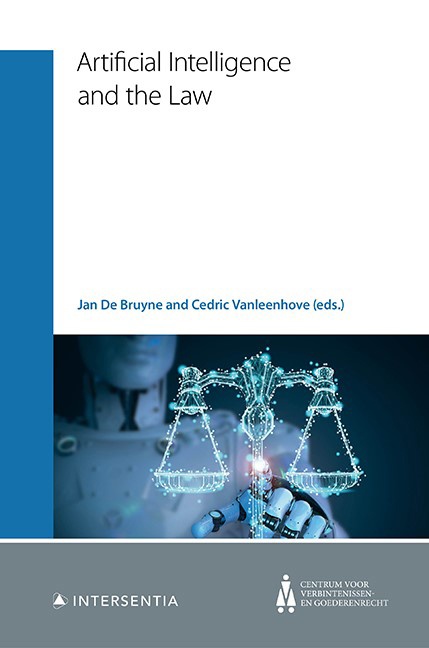Book contents
- Frontmatter
- Contents
- Foreword
- Contributing Authors
- Chapter 1 Basic Concepts of AI for Legal Scholars
- Chapter 2 Different Models of Innovation and Their Relation to Law
- Chapter 3 Setting the Scene: On AI Ethics and Regulation
- Chapter 4 Quantitative Legal Prediction: the Future of Dispute Resolution?
- Chapter 5 AI Arbitrators … ‘Does Not Compute’
- Chapter 6 AI through a Human Rights Lens. The Role of Human Rights in Fulfilling AI’s Potential
- Chapter 7 Killer Robots: Lethal Autonomous Weapons and International Law
- Chapter 8 AI and Data Protection: the Case of Smart Home Assistants
- Chapter 9 AI and IP: a Tale of Two Acronyms
- Chapter 10 Tax and Robots
- Chapter 11 Robotisation and Labour Law. The Dark Factory: the Dark Side of Work?
- Chapter 12 The Hypothesis of Technological Unemployment Caused by AI-Driven Automation and its Impact on Social Security Law
- Chapter 13 AI in Belgian Contract Law: Disruptive Challenge or Business as Usual?
- Chapter 14 Tort Law and Damage Caused by AI Systems
- Chapter 15 Insurance Underwriting on the Basis of Telematics: Segmentation and Profiling
- Chapter 16 AI and Creditworthiness Assessments: the Tale of Credit Scoring and Consumer Protection. A Story with a Happy Ending?
- Chapter 17 AI and the Consumer
- Chapter 18 Robots and AI in the Healthcare Sector: Potential Existing Legal Safeguards Against a(n) (Un)justified Fear for ‘Dehumanisation’ of the Physician-Patient Relationship
Chapter 10 - Tax and Robots
Published online by Cambridge University Press: 26 May 2021
- Frontmatter
- Contents
- Foreword
- Contributing Authors
- Chapter 1 Basic Concepts of AI for Legal Scholars
- Chapter 2 Different Models of Innovation and Their Relation to Law
- Chapter 3 Setting the Scene: On AI Ethics and Regulation
- Chapter 4 Quantitative Legal Prediction: the Future of Dispute Resolution?
- Chapter 5 AI Arbitrators … ‘Does Not Compute’
- Chapter 6 AI through a Human Rights Lens. The Role of Human Rights in Fulfilling AI’s Potential
- Chapter 7 Killer Robots: Lethal Autonomous Weapons and International Law
- Chapter 8 AI and Data Protection: the Case of Smart Home Assistants
- Chapter 9 AI and IP: a Tale of Two Acronyms
- Chapter 10 Tax and Robots
- Chapter 11 Robotisation and Labour Law. The Dark Factory: the Dark Side of Work?
- Chapter 12 The Hypothesis of Technological Unemployment Caused by AI-Driven Automation and its Impact on Social Security Law
- Chapter 13 AI in Belgian Contract Law: Disruptive Challenge or Business as Usual?
- Chapter 14 Tort Law and Damage Caused by AI Systems
- Chapter 15 Insurance Underwriting on the Basis of Telematics: Segmentation and Profiling
- Chapter 16 AI and Creditworthiness Assessments: the Tale of Credit Scoring and Consumer Protection. A Story with a Happy Ending?
- Chapter 17 AI and the Consumer
- Chapter 18 Robots and AI in the Healthcare Sector: Potential Existing Legal Safeguards Against a(n) (Un)justified Fear for ‘Dehumanisation’ of the Physician-Patient Relationship
Summary
INTRODUCTION
1. It is unthinkable to imagine a world without computers and the Internet. Pretty soon, it will be unimaginable to live in a world without robots and AI. Increased automation is currently becoming part of our lives and is not only limited to the industry sector. It has also penetrated the services sector and soon it will become prominent in our everyday lives. As it appears from different chapters in this book, increased automation presents many opportunities to different elements of our society but also many challenges. This is not different in the framework of taxation.
2. In the current state of play, a specific tax on robots does not exist in Belgium. Rather, the profits of corporations generated by robots are subject to tax according to the general corporate income tax (CIT) rules. In this respect, most states treat robots owned by corporations as assets similar to machines or computers which form part of the process of the production of goods or the performance of services. However, there are some governments that have issued proposals or implemented legislation aiming at taxing automation because it is perceived as presenting a threat to the labour market. For example, South Korea has reduced tax incentives for corporations using robots3 and New York City mayor Bill de Blasio has proposed a specific tax on large corporations that use robots to the detriment of labour forces. In this regard, it should be observed that, even in the few cases in which a tax on automation has been proposed/implemented, there is not yet a comprehensive and generally agreed system of taxation of robots amongst countries. In Belgium, the profits derived by robots are taxed together with the other profits of a corporation according to the general CIT rules. However, certain tax incentives apply for companies investing in robots/AI.
3. Although robots are as such not yet being taxed, governments have recognised that the use of robots/AI (and the digitalisation of the economy in general) has changed business models in such a way that corporations can scale up without mass and as such do no longer need the presence of premises or personnel in a particular country in order to conduct their business there.
- Type
- Chapter
- Information
- Artificial Intelligence and the Law , pp. 241 - 284Publisher: IntersentiaPrint publication year: 2021



